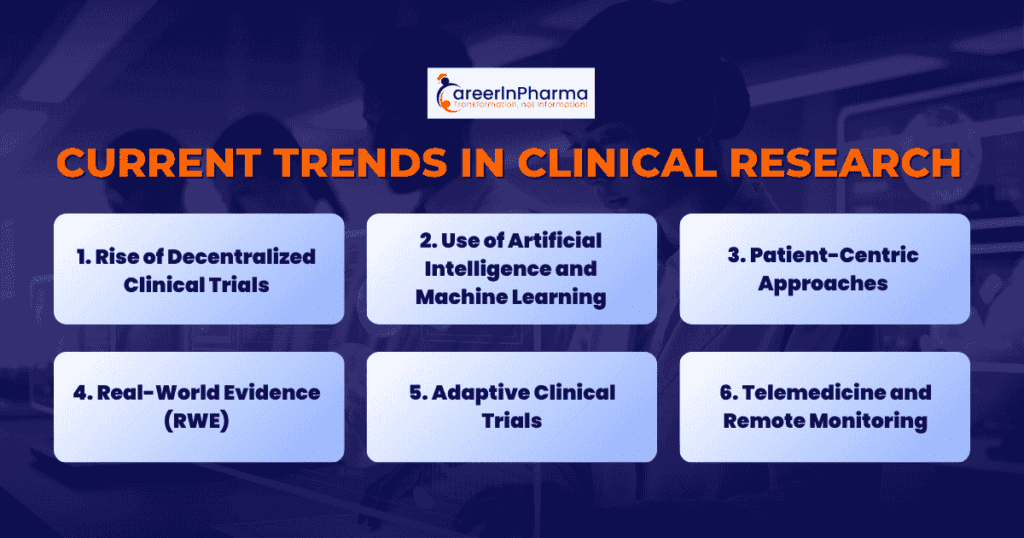
The clinical research industry is continuously developing, you can help scientists develop new medications and other strategies to treat and prevent disease with this technology. As we enter the world of 2025, there are several key trends that are shaping the way clinical research is conducted. In this article, we will explore these current trends in clinical research, focusing on how they are transforming clinical trials and the future of healthcare.

1. Rise of Decentralized Clinical Trials
The rise of decentralised clinical trials is a boon for the industry. This came to light when COVID hit us, the pandemic showed that many trials could continue remotely, leading to the rapid adoption of decentralised models.
In this system clinical trials required participants to visit a physical site to receive treatments, undergo tests, and meet with doctors.
In decentralised trials, patients can be at home and participate from their homes by using wearable devices and digital platforms to collect data and interact with medical professionals with the help of this model accessibility increases rapidly, reduces travel burdens for patients, and allows for more diverse participant populations, including those from rural or underserved areas.
As per the studies by 2025, decentralised clinical trials are expected to be even more widespread, with advantages in telemedicine and digital health tools enhancing the overall experience for patients and researchers alike.
2. Use of Artificial Intelligence and Machine Learning
Artificial intelligence (AI) and Machine Learning (ML) have already begun playing a major role in every sector so in Clinical Research, AI will be the leading arm in any industry as the medical industry evolves, AI and ML will develop drastically which we can not deny there will be a time without understanding this technology no one can success anywhere so it will help in clinical research as well.
This will help researchers identify patterns in large datasets, predict patient responses to treatments, and optimize clinical trial designs. They can also assist in patient recruitment by analysing medical records and identifying individuals who meet specific criteria for a trial. Additionally, AI-powered tools can monitor patient data in real-time, this will also allow quicker responses to potential safety concerns or adverse events.
In 2025 we can easily see that AI and ML will likely be integral to most clinical research processes, making trials faster, more efficient, and more precise.
3. Patient-Centric Approaches
In recent years, patient-centric trials have focused on improving the patient experience by considering factors such as convenience, comfort, and communication. This will include flexible trial schedules, reducing the number of in-person visits, or by using digital tools to keep patients informed and engaged throughout the trial process.
Medical professionals consistently work on making clinical trials even more patient-friendly, with an increased focus on personalized care and active patient involvement. With the help of this approach, we can not only improve patient satisfaction but encourage more individuals to participate in clinical research.
4. Real-World Evidence (RWE)
RWE, we can understand this term as data collected from everyday clinical practice rather than controlled environments like clinical trials. This type of data is increasingly being used in clinical research to complement traditional clinical trial data. RWE can provide a proper report of how treatments work in real-world settings.
As regulatory agencies such as the U.S. Food and Drug Administration (FDA) and the European Medicines Agency (EMA) continue to recognize the value of RWE, its use in clinical trials is expected to grow. By 2025, RWE will likely play an important role in evaluating the effectiveness and safety of new drugs and treatments. This trend will make clinical research more representative of different patient populations and real-world conditions.
5. Adaptive Clinical Trials:
This is also one of the emerging trends in clinical research is to use Adaptive Clinical Trials. In traditional trials, which follow a fixed protocol, adaptive trials allow researchers to make adjustments based on interim results. For example, if early results suggest that a particular treatment is effective, the trial design might be modified to enrol more patients or test higher doses.
How adaptive trials are better than the traditional word is that it can save time and resources by identifying successful treatments more quickly and discontinuing ineffective ones earlier in the process. They also allow for a more flexible approach to trial design, making it easier to respond to new information.
In 2025, adaptive clinical trials are expected to become more common, especially in therapeutic areas like oncology, where new treatments are rapidly emerging. This trend will improve the efficiency of clinical trials.
6. Telemedicine and Remote Monitoring
Telemedicine, known as the remote diagnosis and treatment of patients by means of telecommunications technology, has become an essential tool for healthcare providers and patients, especially during the pandemic era.
In clinical research, telemedicine and remote monitoring technologies are making this process easier for researchers to collect data, monitor patient progress, and communicate with participants without requiring them to visit trial sites. These advantages make the process flexible and easy.
Remote monitoring devices will also advance clinical trials, such as wearables that track vital signs and other health metrics, and help medical researchers gather real-time data from patients. This trend is expected to grow in the coming years, as more clinical trials adopt telemedicine and remote monitoring solutions to improve efficiency and patient engagement.
Conclusion
As we are in 2025, these trends in clinical research are shifting toward more flexible, patient-centered, and data-driven approaches. The rise of decentralized trials, the integration of AI and machine learning, and the increasing use of real-world evidence are all playing crucial roles in transforming the clinical research process. These trends not only make clinical trials more efficient and accessible but also make the way for more personalized and effective treatments in the future.
The clinical research industry is at the forefront of medical innovation, and with the continued evolution of these trends, we can expect amazing advancements that will improve patient care and outcomes worldwide. The future of clinical research is bright, and as these trends continue to take shape, they promise to revolutionize the industry.
If you want to make your career in clinical research then Join CareerInPharma the best clinical research institute in India for clinical researchers to become an expert in this crucial field! With world-class training, and industry insights. Choose a career that matters and grow with us in the fast-paced, ever-evolving world of clinical research. Start your journey to making a difference today!

